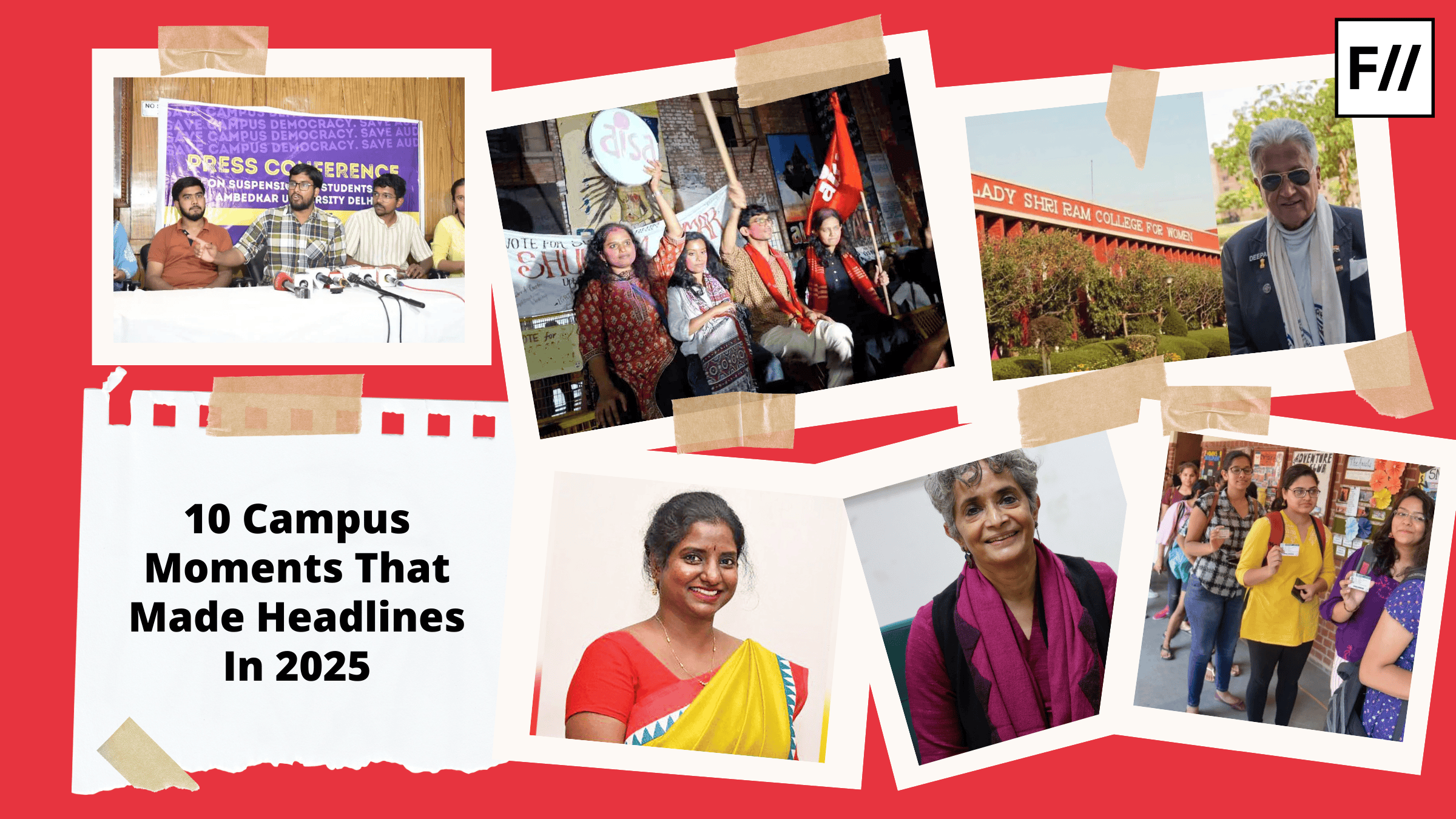Editor’s Note: This month, that is November 2020, FII’s #MoodOfTheMonth is Sexual And Reproductive Health, where we invite various articles to highlight how health outcomes are determined with respect to a person’s social, political, economic and cultural contexts of their gender and sexuality, and how these identities shape their life experiences vis-a-vis SRHR in India. If you’d like to share your article, email us at pragya@feminisminindia.com.
TW: Non-consensual sexual activity, sexism, stigmas on sex and sexuality.
Do we in India really have a culture of talking about sex? The short answer: it’s complicated. But in my experience, mainly not. However, as I move on into this article, the broader point I’m trying to make is not this. Rather, it’s about the impact the lack of conversation/distorted conversation surrounding sex influences a person’s views on what sex is.
Childhood Meanings of Sex
Hailing from a very privileged background, I learnt about sex early on from my friends in 5th grade – but people now might be learning about it much earlier. They too didn’t really know much, it was just what they heard from their elder brothers/friends. The conversation on sex was largely “two people reproducing to have children”, which then moved on to how everyone has sex and it’s normal.
Most of the time, they would discuss porn – about how the ideal woman’s body looked. Big breasts, huge butt, skinny waist & extremely white. No one really talked about the guys in porn. I grew up to think that sex is all about male pleasure. The woman was always, ALWAYS the object. It was also, always between a man and a woman.
Most of the time, they would discuss porn – about how the ideal woman’s body looked. Big breasts, huge butt, skinny waist & extremely white. No one really talked about the guys in porn. I grew up to think that sex is all about male pleasure.
Of course, totally wrong, but we’ll get there.
It was (and continues to be) a tabooed topic in Indian families. I’m sure many of y’all would have had the same experience! We have all heard the classic ‘god gave a blessing’ story. When your parents find out you know about sex, they just deny it and move on with their lives. Wouldn’t it be much better if we had a candid conversation, in which I learned some actual stuff?
In 5th grade we also had a single “sex education” class – which was basically the school counsellor telling us to have sex after marriage (yup, really).
Sexuality was not a thing that was to be taken seriously. This was when the famous “Justin Bieber is gay and so I don’t like him” jokes started cropping up. And of course being gay was not an option we had – or even considered. “Girl on girl” action was once again simply discussed in the context of male pleasure.
High School
So picture that you’re bigger now – you’re in high school. You still have the same notions of sex – except now romantic relationships have crept into the picture. At least in my peer group, dating became the coolest thing. Hence, one could only dream of having sex with one person i.e. their boyfriend/ girlfriend. But no-one really told anyone how to get there. Guys and girls would hold hands where teachers couldn’t see, but when the teachers DID see, they’d just pull apart their hands. We always assumed it happens organically & everything is perfect that way.
And nobody – not your family, your friends, and certainly not your school has ever talked about consent. I had boyfriends too of course. And sadly, not one of them ever really thought about consent. There were also instances of many of my friends being groped on their breasts/butt – and they were supposed to just shake it off.
Nobody ever talked about sexuality either. But gay jokes were still in.
Life After School
Before going to college, I was told to be wary of ‘strange boys’. No-one that we know can ever do anything wrong, right? (Sarcasm, yeah)
I went to college and things did change for me. I met a man who asked for my consent with regards to almost everything. I would initially say—why are you even asking? My learning throughout my life told me that I don’t have an opinion, right? But he taught me that I do. And that has been such a valuable learning for me – I look at sex differently now. I talk about sex differently now. I am more vocal about sexual abuse now.
But I remember telling a certain man about how that guy takes consent very seriously, and I was told, “But it’s so weird to do this when you’re hooking up. It ruins the spontaneity.” No. Consent does not work that way.
Being in a liberal arts college helped—people modulated what they said to each other, and I learnt so much about what sex is! I didn’t just learn about consent – I also learnt that sex isn’t binaried.
Of course, in the outside world it continued to be filled with gay jokes, derogatory statements about women being “loose characters”, and I heard more and more stories of people who had been abused or harassed without their consent (typically the women, but also sometimes men). Actually, I should correct myself here. It wasn’t just the outside world. There were PLENTY of stories of sexual abuse in my so-called “woke” college too.
Also read: Microaggressions: The Small Big Things About Gender, Sex And Sexuality
Some More Musings
All this might seem obvious – maybe because we know all this information now.
But the cultural environment can impact one’s perceptions & consequently their actions during a sexual activity. If we are to get more serious here – let’s talk a bit about me. No-one took consent before I knew what it was all about & how to enforce it in my life. Not hearing or learning about consent made me believe that sexual experiences for women, even if forced, HAVE to be good. I disregarded sex between different genders because I simply didn’t know about them.
But the cultural environment can impact one’s perceptions & consequently their actions during a sexual activity. If we are to get more serious here – let’s talk a bit about me. No-one took consent before I knew what it was all about & how to enforce it in my life. Not hearing or learning about consent made me believe that sexual experiences for women, even if forced, HAVE to be good.
Now let’s zoom out from me for a second. What’s happening in our country?
- Domestic violence against women is rampant
- Strong, dominating women are not tolerated
- Women must leave their jobs for marriage and children
- Abuse of men go unreported/ ridiculed, different sexualities are not considered to be important
- Rape as always is acceptable in certain political, religious & caste-based situations
- Women who sleep with multiple partners are stigmatized as ‘loose’.
What Can We Do?
- Please, please, learn more about sex, consent, and sexuality – simply because the more you know, the more empathetic you can be.
- Explain to your friends, children and family, the meaning and importance of consent. Don’t let jokes about these slide. Educate your child on this so that they are well-aware.
- Take consent – your gender doesn’t matter here. Take the consent of the other person if they are FINE with something, if they are ok with it. It’s not weird. I REPEAT, IT’S NOT WEIRD.
- We all make mistakes – Misgendering people, spontaneously judging people for their sexuality, but RECOGNIZE them as mistakes and LEARN FOR THE NEXT TIME.
- Be accepting – your friend, child or relative can come out to you, or can tell you about a horrifying sexual experience that happened to them. Don’t shun them, don’t tell them they are wrong. Take action where possible (e.g. if it’s a relative, DON’T LET IT SLIDE) & otherwise make the experience one of comfort.
- Sexual activity is important. For mental health, for intimacy, for social acceptance and many things. If someone is sleeping with multiple people, or is sleeping with someone of the same gender – Don’t judge them. It’s normal.
- Criticise family members and politicians who invalidate experiences (e.g. justifying rape on religious grounds, saying that a woman was “asking for it” because of her clothing and so on). Criticize them, explain to others who disagree that it’s WRONG.
Also read: Disability And The Need For An Inclusive Sex And Sexuality Education
Awareness is the first step, but it can take you a long way.
Rishika Basu Majumdar has pursued her B.A. & PG Diploma in Psychology & is currently working. She also has a thrift shop of her own! As one can tell, her interests have a wide range – from wanting to learn more about the world to assisting with social & psychological issues. Some things she thinks about in the latter are mental health, the LGTBQ+ community, sexual health and wellness, minority rights, women’s rights, and so on. You can find her on Facebook and Instagram.




